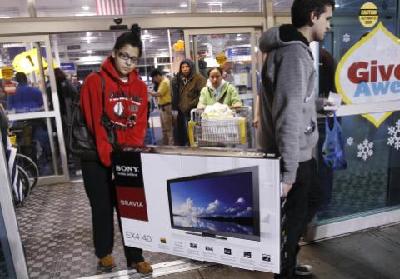
This is the VOA Special English Technology Report.
As the year comes to an end, we talk about some of the top technology developments of the last ten years. The technological revolution is changing the way we work and play.
Mobile phones became smartphones, with abilities like computers. Many people started reading books on electronic readers. Televisions became high definition and the screens became flat. Digital music players got smaller in size but large enough for people to download their entire music collections.
Worldwide, broadband subscriptions passed 500 million. And at least two billion people are expected to be online by the end of this year.

Stephen Baker is the vice president of industry analysis for the consumer electronics market research group NPD. He says the technological developments of the 21st century have brought about some historic advances in consumer electronics.
STEPHEN BAKER: "Ten years ago is irrelevant in consumer electronics. Ten years ago might as well be 100 years. Certainly if you look back at the way people interacted with electronics in 2000 and the way they interact with them today, there is no comparison.
"Ten years ago we didn't have flat-panel televisions. We really didn't have mobile Web devices or smartphones. We didn't have e-book readers. Very, very few consumers had notebook computers. There was no Wi-Fi. Just not even a similar experience to what the world was like ten years ago."
Bruce Bachenheimer is with the MIT Enterprise Forum in New York. He is also the director of entrepreneurship at Pace University. We spoke with him about what he believes are the most important developments of the 21st century.
BRUCE BACHENHEIMER: "If I were looking at technology that has really impacted us over the last ten years, I would go in order: mobile computing, the proliferation of digital media content, broadband -- mobile and at-home access -- social media platforms and user-generated content, cloud computing, digital photography and GPS. And what I mean by GPS is GPS for the masses, although global positioning systems have been around for quite a while."
Mr. Bachenheimer says all of these things have worked together to revolutionize technology. And, he says the technology is constantly changing, faster than at any other time in history.
BRUCE BACHENHEIMER: "The life cycle of these products are so much shorter. If you look at having a telephone, a home phone back in the 1950s, 60s, 70s and 80s, it was exactly the same phone. Nothing changed for three or four decades.
"Basically you had a choice of three colors, tan, white or black. And you could either have it mounted on a wall or on a table top, whereas now you look at something like a cell phone. How many people have a cell phone that's more than a year or two old?"
And that's the VOA Special English Technology Report, written by June Simms. Follow us on Facebook, Twitter, YouTube and iTunes at VOA Learning English. I'm Steve Ember.
proliferation: the sudden increase in the number or amount of something; a large number of a particular thing 激增;涌現(xiàn);大量的事物
谷歌發(fā)布智能手機(jī)NexusOne iPhone終遇對(duì)手
Mobile phones aim to take load off wallets
Media technology: Adobe and Apple reach a flash point
2012年手機(jī)將實(shí)現(xiàn)無(wú)線充電
(來(lái)源:VOA 編輯:崔旭燕)
